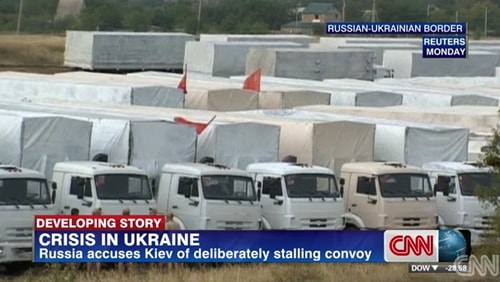Invader or savior?
(Baonghean.vn) - On Friday, August 22, a Russian truck convoy entered eastern Ukraine. Russia explained this move as humanitarian aid, while the Kiev government called it a direct "invasion".
There is still no definitive answer as to the real motive for this move, however, it is clear that the tense atmosphere in Europe has just reached a new level, after a series of upheavals in recent months. The latest development concerns aid sent from Russia to Ukraine. Ukraine has been blocking a Russian convoy of trucks across the border for days and only learned that it contained humanitarian aid packages on Sunday, August 17.
 |
| (CNN) Russia condemns Ukraine for obstructing humanitarian aid convoy |
This information did not end the discord and controversy between the two sides. On Friday, August 22, 227 Russian trucks entered Ukrainian territory, according to the announcement of the Organization for Security and Cooperation in Europe. This organization is responsible for observing the border checkpoint through which the convoy passes. All vehicles transporting relief goods must be accompanied by members of the Red Cross. However, the Red Cross said that the "volatile security situation" in the region does not allow them to do so, referring to the continued fighting between pro-Russian separatists and the Ukrainian army.
The Kiev government has repeatedly accused Russia of directly and indirectly supporting the separatist insurgency in Ukraine. According to Kiev and its allies, including the NATO military alliance and its key member, the United States, the convoy is Russia's most blatant and obvious move to date. "We call this the first invasion under the dubious guise of the Red Cross," said Valentyn Nalyvaychenko, head of Ukraine's security service. So far, Ukraine has shown no intention of pursuing the convoy. Nalyvaychenko maintains that Russia's main motive is to supply the rebels and that the drivers were not civilians.
On the Russian side, President Vladimir Putin said that it was not his government, but the Kiev government that was irresponsible and "adding fuel" to the unrest in eastern Ukraine. He expressed "deep concern" about the endangered population and other consequences of the "escalation of hostilities" in Ukraine to German Chancellor Angela Merkel. He also condemned "Ukraine's blatant attempts to obstruct Russia's humanitarian aid deliveries" to southeastern Ukraine, stressing that he had no choice but to act. "Further delays in the delivery are unacceptable," a Kremlin statement said.
The international community has not been enthusiastic about Russia's claims. Britain's UN ambassador Mark Lyall Grant said Russia had not received any support at Friday's Security Council meeting on the issue. "This is a blatant and undeniable violation of Ukrainian sovereignty, international law and the UN convention. It has nothing to do with humanitarian aid," Lyall Grant told reporters. NATO Secretary General Anders Fogh Rasmussen warned that "this so-called aid convoy...will only aggravate the crisis in the region caused by Russia. The failure to respect international humanitarian conventions raises the question of whether the real purpose of this convoy is to provide aid to civilians or to supply weapons to the separatists." Angela Merkel not only had a conversation with Mr Putin but also expressed her concerns to US President Barack Obama. The two leaders agreed that Ukraine has been "going downhill since the tragedy of Malaysia Airlines Flight MH17". They also shared the view that Russia's latest move was "a provocation and a violation of Ukrainian sovereignty", and called on Russia to immediately stop the movement of "military personnel, equipment and armored vehicles into eastern Ukraine". Pentagon spokesman John Kirby said: "Russia must withdraw its personnel and vehicles from Ukrainian territory immediately. Otherwise, there will be a much greater price to pay".
It’s not just vehicles that are massing on the Russian-Ukrainian border. As of Friday, the number of “ready to fight” troops had reached 18,000, a significant increase from previous public estimates from the Pentagon, a U.S. defense official said. Several units are now stationed on roads and towns 2 to 10 miles from the border, another official said. The U.S. has believed for weeks that some Russian troops have crossed the border into Ukraine, the official added. More worryingly, Russia appears to be moving long-range weapons and advanced systems, including at least two SA-22 surface-to-air missile systems and components for longer-range weapons.
According to the United Nations, the crisis in Ukraine has killed 2,000 people and injured 5,000 since mid-April. This includes the kidnapping and assassination of Lithuania's honorary consul in the city of Luhansk, Mykola Zelenec. Most recently, in response to Western sanctions, Russia made a dangerous move by attacking the American fast food chain McDonald's. Obviously, with Russia being a large market, this move is expected to cause many indirect but unavoidable losses for the United States, the leader of the other side of the front line. In response, the West has yet to make any retaliatory moves, except for the European Football Federation (UEFA) declaring that it will not recognize any Russian football matches involving Crimean teams, because the Ukrainian national football federation has sued UEFA that Russia has taken away 3 of its teams "illegally and arbitrarily". But this is unlikely to cause any trouble for President Putin or upset the population that is counting on humanitarian aid from Russia. Instead, it seems that the West is being cornered and needs to find a more effective move than just making threats.
Ganoderma






